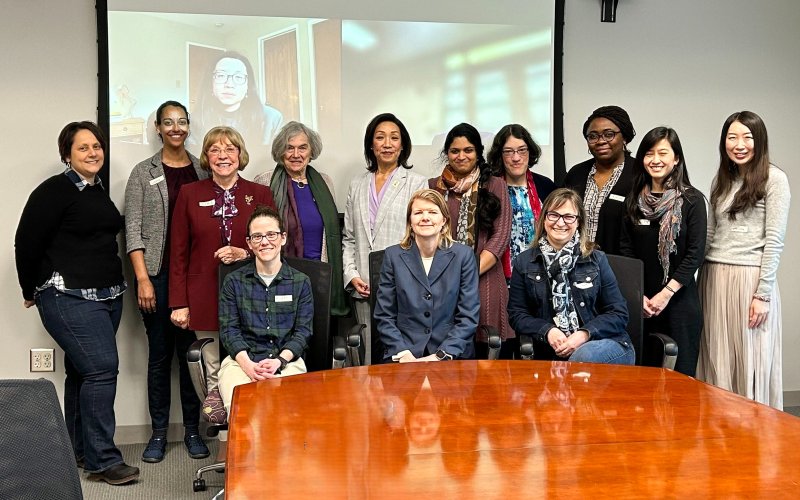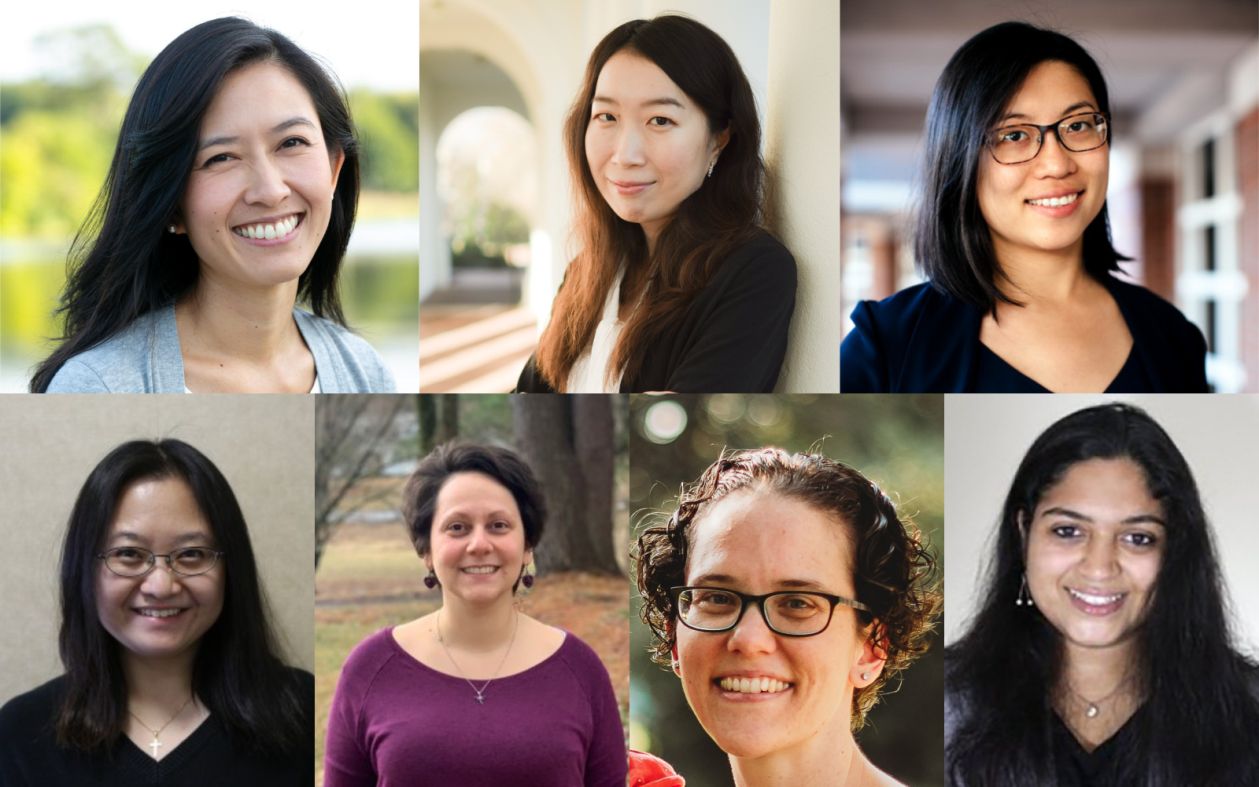‘Project SAGES’ Supports UAlbany Women Researchers in STEM

By Erin Frick
ALBANY, N.Y. (April 6, 2023) — Now in its second year, University at Albany’s Project SAGES — short for “Striving to Achieve Gender Equity in STEM” — is thriving. The initiative is supported by the National Science Foundation (NSF)’s ADVANCE program, which aims to increase the representation and advancement of women in STEM (science, technology, engineering and mathematics) careers.
As one of the nation’s most diverse public research universities, UAlbany is committed to attracting and supporting faculty members who are underrepresented in their fields. Project SAGES is designed to advance this goal and provides opportunities for UAlbany’s women researchers to develop projects and expand their collaborative networks. The initiative launched in 2021, supported by a 3-year, $1 million NSF grant.
Two major funding categories under the Project SAGES umbrella are the External Sponsor Program (ESP) and the Seed Grant Program (SGP).
External Sponsor Program
The External Sponsor Program provides funding to help the awardee develop a scientific relationship with a prominent expert in their field who serves as a mentor and intellectual sounding board and assists with networking beyond the UAlbany campus. Funds awarded through this program cover an honorarium for the mentor and support travel expenses for both parties so they can visit each other’s home institutions.
“It’s enormously rewarding to interact with these young ESP awardees, and see their confidence grow as they interact with leaders in their fields and expand their networks in ways that would never have been possible otherwise,” said Professor Marlene Belfort, one of four co-PIs on the grant. “Getting ahead is often about who you know. The ESP is therefore an extremely valuable component of Project SAGES in terms of advancing the careers of our female faculty.”
“The External Sponsor Program has been a very successful initiative of Project SAGES,” said Christine Wagner, associate vice provost for faculty development and co-PI on the project. “In the coming year, we will continue to offer this opportunity to additional women in STEM, but also hope to expand the idea to women in disciplines beyond STEM, as well as adapt the program to support women’s leadership.”
2022 ESP Awardee Updates
Aubrey Hillman is an assistant professor of atmospheric and environmental sciences. Her work focuses on using lake sediments to reconstruct past climate change and human activities. Hillman was the recipient of an External Sponsor Program award, which she has used to develop a research partnership with Mark Brenner of the University of Florida.
“Mark Brenner is a prominent geological scientist whose research interests align very closely with my own,” Hillman said. “Since becoming acquainted, I have consulted with Mark on developing grant ideas (such as spearheading research projects on lakes in the Adirondacks), conducting field work in challenging international environments (including guidance on best practices for transporting gear and samples throughout Asia and South America), and balancing research priorities.
“I could explain in detail the many ways that Mark has been an important mentor to me, but I think there are two that best exemplify the benefits of the External Sponsor Program. At a recent international conference, Mark introduced me to just about everyone there, many of whom are influential members of the community and who I am now developing projects with. Most recently, as Mark has stepped down as the editor for our specialty journal, he put forth my name as a new potential associate editor, further increasing my professional network.”
Hyun-Kyoung Kwon is an assistant professor of mathematics and statistics, working in the field of analysis. Kwon’s ESP mentor is Raul Curto at the University of Iowa.
“I have known Raul since I was a grad student. He gave me great advice after looking at my recent paper that connects my previous work to an area that I was not familiar with before. I work with a special kind of mathematical operator that is closely related to another research field in mathematics. My goal is to find out when two operators are the same in a mathematical sense. I am also trying to find a connection between this problem and the corona problem, which is related to control theory in engineering.”
“Raul is part of a large research group in Iowa, all of whom work in areas related to my field. He and his colleagues study different problems from the ones I am currently working on, which is really exciting. I am interested in trying different problems and hopefully, through this partnership, I will get exposed to many interesting new problems that I can start thinking about."
Betty Lin, assistant professor of psychology, studies the ways that factors such as stress, poverty and minority status influence children's social and emotional development beginning as early as the prenatal and early childhood years. Lin’s ESP award has afforded her the opportunity to collaborate with Julian Thayer of University of California, Irvine.
“Julian Thayer is a distinguished scholar working at the intersection of health disparities, race and heart rate variability,” Lin said. “Through this partnership, I’ve been able to deepen my understanding of psychophysiology, and its potential role in mediating stress-health disparity links. I am also excited to continue to consult with him on forthcoming work, particularly for the ‘Birth and Beyond’ study investigating the social and environmental determinants of Black maternal-infant health.
“Our partnership has also spurred broader UAlbany connections. While visiting campus to deliver a talk earlier this academic year, Julian met with several of our students and faculty. Since then, he has begun working with several of the students in our department in various capacities. Further, he supported my application to the JPB Environmental Health Fellowship Program and recommended me for an Early-Stage Investigator award through the Academy of Behavioral Medicine, both of which were successful.”
Haruka Takayama is an assistant professor of economics. Her research focuses on how foreign direct investment shapes patterns of international trade.
“When a multinational firm invests abroad, it can either establish a new facility or purchase a local firm. My research asks how firms' intangible assets — things like their brand name or intellectual property — affect which type of investment they pursue. The ESP has provided me with an amazing opportunity to connect with a prominent female economist in my field, Natalia Ramondo of Boston University. My meetings with Natalia have given me valuable perspective on my own work, and exciting ideas for where to take my research in the future.
“This year, I had the opportunity to organize a session about multinational production at the American Economic Association meeting where I connected with many economists and started a new collaborative project on cross-border mergers and acquisitions, and firms' global production networks. Natalia advised on participants to include in this session. Through these new connections, I have developed a network of colleagues and coauthors whom I look forward to engaging with over the years to come.”
Seed Grant Program
The Seed Grant Program (SGP) awards $15,000 to a female UAlbany PI who has a primary appointment in a STEM field and is a tenure-track assistant professor, tenured associate professor or research scientist on a permanent track.
“In the second year of Project SAGES, we have continued initiatives aimed to bridge the gender gap in STEM and help women faculty achieve their professional goals,” said Distinguished Service Professor Edelgard Wulfert, who is the project director and a co-PI. “The Seed Grant Program offers grants for junior women in STEM to build research teams and gather pilot data which can later be used for federal grant applications. It empowers women by giving them access to resources with which to network and advance collaborative projects. To date, we have awarded six seed grants and plan to solicit another round of applications in the summer.”
“The Seed Grant Program has enabled several new collaborative teams driven by female researchers to get started on exciting new projects and improve their chances of obtaining long-term federal funding,” said Professor Melinda Larsen, the fourth co-PI on the project. “This initial phase of data collection, for any new project, can provide the critical proof of concept needed to help establish the work and spark new ideas. I’m excited to see how this program will promote the career development of the SAGES awardees.”
2022 SGP Awardee Updates
Cuicui Chen is an assistant professor of economics. Her research lies at the intersection of environmental and energy economics and industrial organization. Chen’s SGP award has enabled her to pursue a new avenue of research examining the economics of truck electrification.
“Environmental justice criteria have been increasingly included in environmental policy at all levels of U.S. government, yet explicit guidance on how to incorporate these criteria scientifically and consistently in policy evaluation and design is lacking,” Chen said. “Thanks to the Seed Grant Program, I’ve been able to undertake a project that addresses this gap in the context of truck electrification — an area of active policy making that is currently underway in 15 states and centers environmental justice as a leading motivation.
“Together with my UAlbany collaborators Chunyu Guo and Daiqiang Zhang, we have created a framework that combines monetized pollution damages with underlying income distribution and constructs three environmental justice metrics that align with regulator preferences. The framework ultimately allows us to identify charging infrastructure designs that best deliver on the environmental justice goal of truck electrification.”
Cecilia Levy is an associate professor of physics. With Matthew Szydagis, Levy is leading a novel approach to detecting dark matter using supercooled water.
“To prove the existence of dark matter, we need to detect it, and to detect it, we build experiments,” said Levy. “At UAlbany, we invented the ‘snowball chamber’ which is a new kind of radiation detector that uses supercooled water and could be used as a dark matter detector as well as a general radiation detector.
“This new concept is still in its infancy but has proven to have good potential as a tool to help prove the existence of dark matter. The issue of course is that funding a brand-new idea like the ‘snowball chamber’ has been very difficult. The award from SAGES has allowed us to make sure the project survives and has allowed us to buy equipment, support students and build what we need to take more data and demonstrate our detector’s potential. Newer, better results will hopefully help attract more funding and allow the work to further evolve.”
Sweta Vangaveti is a research scientist and advanced computational facility manager in the RNA Institute, who has used her SGP award to collaborate on a new project with Arun Chandrasekaran.
“The Project SAGES seed grant was immensely helpful in getting the project up and running,” Vangaveti said. “The funding allowed us to establish our collaboration and generate sufficient, promising and much needed preliminary data to apply for a larger grant.
“We are developing a computational pipeline to explore DNA nanostructures as a drug delivery system. These nanostructures are tiny molecular structures built using DNA. They are biocompatible, induce a minimal immune response and are well suited for drug delivery. Given a drug of interest, the goal of the computational pipeline is to test multiple nanostructures to find the best combination of the drug and its delivery nanostructure to optimize drug loading and delivery. This process would significantly reduce the number of experiments, time and resources required for designing and optimizing DNA nanostructure-based drug delivery systems.”
Looking Forward
“The Project SAGES co-PIs and Provost Carol Kim recently had a lively meeting with all the program awardees,” said Marlene Belfort. “Their enthusiasm for advancing their science was palpable. It is our hope that as these young faculty mature, they will become trailblazers not only in their scientific fields, but also as leaders of those underrepresented in STEM.”





